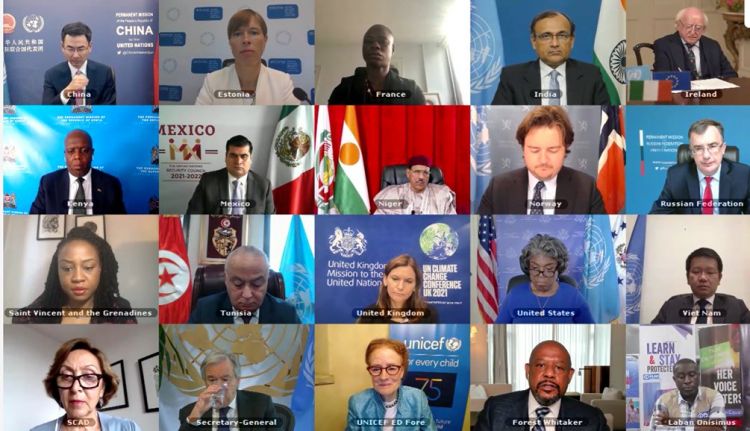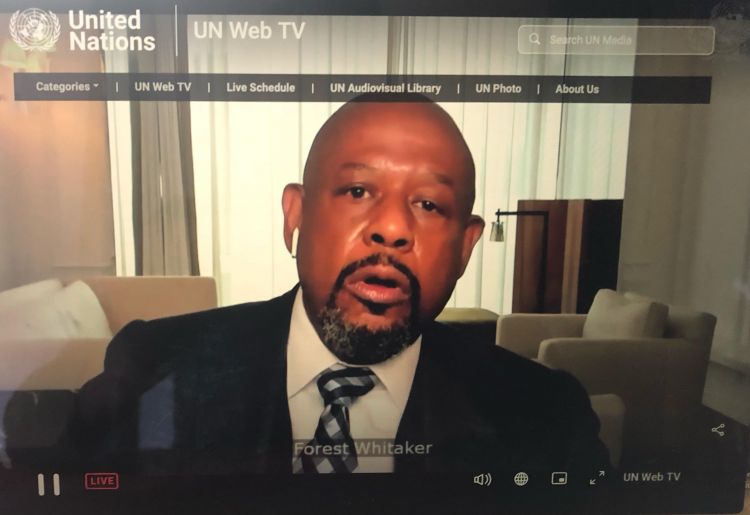
June 28, 2021 – Earlier today, the Whitaker Peace & Development Initiative’s (WPDI) CEO and Founder, Forest Whitaker, addressed the Open Debate of the United Nations Security Council (UNSC) on the issue of children and armed conflict. He was invited to share his experience and perspective at the invitation of the Council’s Chair, the President of the Republic of Estonia, Ms. Kersti Kaljulaid. At the open debate, Mr. Whitaker called on the United Nations (UN) and its member states to do more to rescue and reintegrate children and youths in conflict-impacted areas – especially for girls. He also reflected upon and provided examples of how, when empowered, young people in some of the world’s most conflict-impacted areas can spark remarkable change in their communities.
In 2020, the situation of children in armed conflict was marked by a rise in the number of grave violations, with verified cases of abduction and sexual violence perpetrated against children of particular concern – nearly 20,000 in total. Around the world, the protection of children was strongly impacted by the escalation of conflict and its ripple effects, which included attacks on schools, the denial of humanitarian access, and even the recruitment of children as child soldiers. This was only exacerbated by the COVID-19 pandemic and its impact on the socio-economic situation of many communities affected by conflict.
Forest Whitaker was invited to speak before the council in his capacity as the Advocate for Children Affected by War in relation to his close cooperation with the Office of the Special Representative of the UN Secretary-General for Children and Armed Conflict, Mrs. Virginia Gamba. Also participating in the debate were Ms. Henrietta Fore, the Executive Director of UNICEF, and H.E. Mr. Michael Higgins, the President of the Republic of Ireland.
The Open Debate examined these issues within the scope of the annual report of the Secretary-General on children and armed conflict, seeking to rally more governments and NGOs behind this universal cause. With respect to preventing the forced enrolment of children, H.E. Kersti Kaljulaid stated that “We need strong accountability measures for grave violations against children and for cooperation with relevant international accountability mechanisms.” The UNSC also examined ways to further improve the action of the United Nations, Governments and Civil Society to better care for former child soldiers, in line with WPDI’s work in conflict affected areas.

In his remarks, Forest stressed how violations committed against young people “have invisible impacts that last much longer than the violations themselves … These children lose months or years of education. Such gaps will turn into jeopardized careers and reduced opportunities. And, in many cases, their opportunities will also be limited because of a second invisible impact of the grave violations, social stigma. Their families and communities often refuse to take them back or care for them. Many will end up on the streets or join gangs. Stigma is one of the most reoccurring issues in the discussions I have with the former child soldiers who join my organization.” He stated that “children affected by conflict cannot walk out of their night in a day. Reintegration will not succeed without patience and determination. We need to offer them a continuum of care that will span childhood, adolescence, and youth, addressing their needs in terms of education, economic opportunities, and psychosocial support.”
He also shared stories in the open debate about how, when given the tools and skills to do so, youths impacted by violence and conflict can have a remarkable, positive impact on their communities. He spoke about Susan, who was abducted by the Lord’s Resistance Army in Northern Uganda while she was on her way to school when she was just seven years old. After being beaten and abused for months, she managed to escape after taking shrapnel in a leg, but her suffering was not over. Like countless other youths affected by conflict, she was stigmatized by her community for years. But, after being trained by WPDI to become a Youth Peacemaker, Susan is now 24 years old and the Female Youth Counselor of her town. She is a respected community leader, teaches peace education to primary and secondary school students, and mediates land disputes in her community.
Our hope is that publicizing such examples of resilience and courage in former child soldiers will contribute to increasing the awareness of the international community on the need for ambitious solutions. As Mr. Guterres declared, “We need to elevate children’s voices and best interests in peace processes and political decision-making.” To achieve this, indeed, the world must prevent the enrolment of children in armed groups but also improve capacities to provide them long term care so they can recover, rebound, and become the active peacebuilders that their communities need. They deserve a second chance.